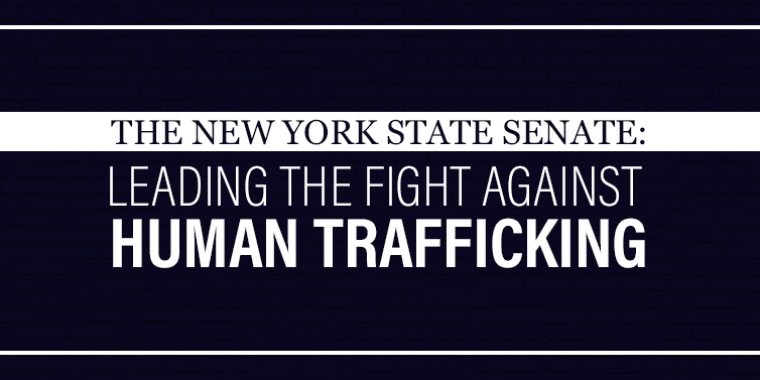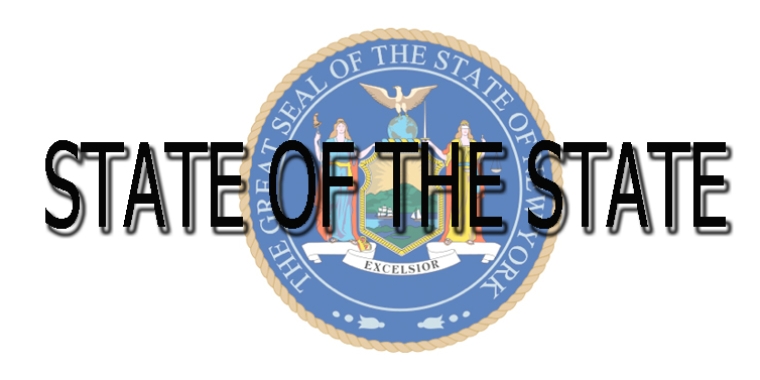
Three Senate Bills To Combat Human Trafficking Signed Into Law
August 16, 2018

Measures Help Stop the Sexual Exploitation of Children and
Increase Access to Crucial Services for All Victims of Human Trafficking
Senator Phillips today announced three bills helping to end the sexual exploitation of children and provide victims of human trafficking with potentially life-saving services have become law.
“Astonishingly, sex trafficking continues to plague communities across the state and Long Island. The safety and security of our children is paramount and I am committed to doing all possible to the protect victims while seeking justice,” said Senator Phillips. “While in recent years New York has strengthened its criminal justice response to trafficking by increasing the accountability of traffickers, patronizers, and other exploiters - the law did not go far enough in helping to prevent the prevalence of the sexual exploitation of minors by holding traffickers more accountable for the devastating impact they have on the lives of children they abuse. I was proud to support several measures aimed to stop the sexual exploitation of children, increasing access to help and providing safe housing for victims.”
Helping to Stop the Sexual Exploitation of Children:
A new law (S5988A) closes this dangerous loophole by creating the necessary criminal charge of sex trafficking of a child – eliminating the need to prove force, fraud, or coercion where a child under 18 engages in commercial sex. Unlike federal law, New York statutes prior to the signing of this bill put the onus on prosecutors to prove force, fraud, or coercion was used in order to find a person guilty of sex trafficking, even if the victim is a minor.
Increasing Access to Help for Victims of Human Trafficking:
Despite the fact that human trafficking is a multi-billion dollar industry, many New Yorkers never see its effects, and namely, the victims among us. Reports indicate that trafficking networks often rely on legitimate businesses, such as hotels, to sustain their illegal operations. Because hotels are a known location for exploitation of victims, hotels are an ideal location for presentation of information about services for victims.
A new law (S8874), requires facilities such as hotels, inns, and motels to provide informational cards on the services available to victims of human trafficking. Information about services, such as the national trafficking hotline, will be made readily available to trafficking victims and other hotel guests and displayed in public spaces such as public restrooms, individual guest rooms, and near the entrance. This will ensure that victims have access to a discreet informational card so they are able to call the hotline for help at a later time.
Additionally, (S7836) will help expand the availability of the Human Trafficking Intervention Court (HTIC) Initiative to reach more victims. The Courts were created to provide alternatives to incarceration for people arrested on prostitution charges, since many of the defendants were also victims of human trafficking. Previous law stated that four of the six HTIC courts outside of New York City lack jurisdiction to see cases that originate outside of the local criminal courts where they are physically situated. This new law expands that jurisdiction so that more victims would be eligible to receive the crucial services that are appropriate for their individual situations, including counseling, job training, education, housing, and medical treatment, among others.
Providing Safe And Supportive Housing To Victims:
For many victims of human trafficking, one of the most immediate needs is a safe, supportive place to stay, especially for survivors who are fleeing an exploitative work or living situation.
Another measure, bill (S8305) has also been delivered to the Governor for review and helps establish short-term and long-term safe house residential facilities to be operated by not-for-profit agencies for victims of human trafficking. The residential facilities will be crucial in providing vulnerable victims services that include emergency shelter, food, clothing, medical care, and counseling and crisis intervention.
###
Share this Article or Press Release
Newsroom
Go to NewsroomNew Laws Taking Effect in 2018
December 31, 2017



